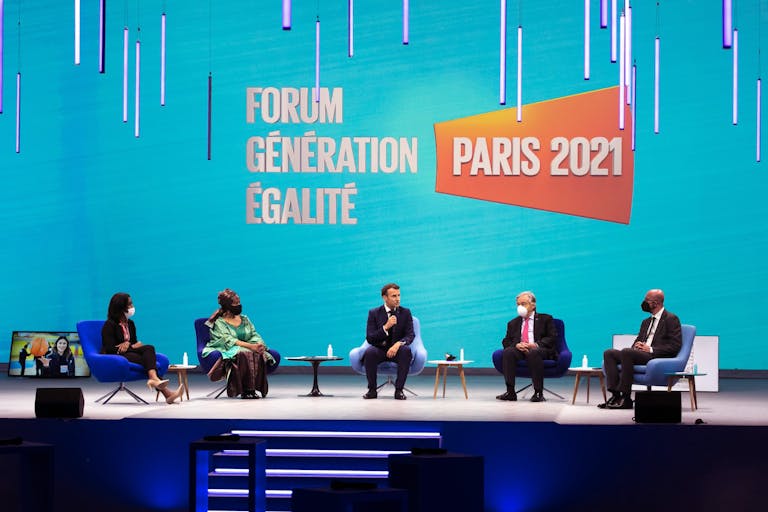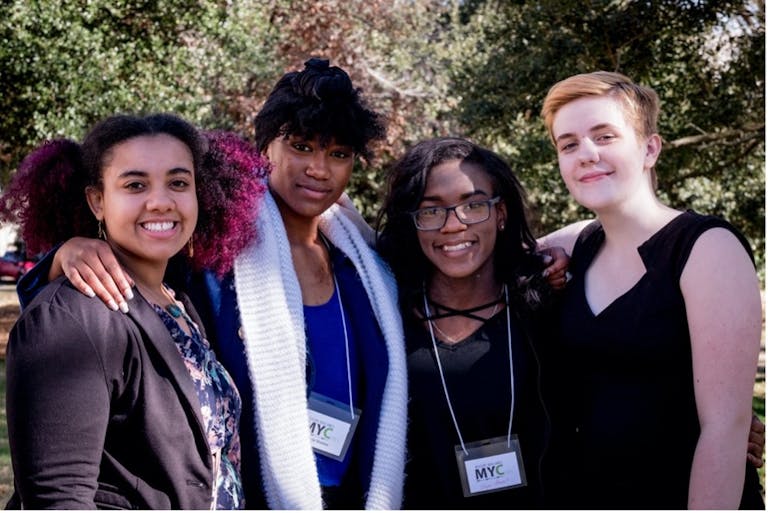The Generation Equality Forum in Paris came to a close last week after three jam-packed days of spirited dialogue and robust commitment-making, which signaled higher ambitions and a new global call to action for gender equality.
Twenty-six years after the Fourth World Conference on Women in Beijing — the last global gathering of this size dedicated to gender equality — the Generation Equality Forum delivered a bold new strategy and $40 billion in pledges to support it. Here’s what we saw and heard, in Paris and beyond.
Heads of state and high ambition
The opening ceremony, LIVE from Paris, featured financial commitments from the public sector, civil society, philanthropies, and the private sector. Over the next five years, gender equality will benefit from new investment, including:
- $23 billion from United Nations Member States and international organizations.
- $13 billion from the private sector.
- $4 billion from philanthropies.
The $40 billion total is the largest-ever funding pledge explicitly for gender equality. It is dedicated to six key issues and includes commitments to change laws, improve policy, and put resources in the hands of grassroots leaders.
World leaders attended in person, including President of France Emmanuel Macron, UN Secretary-General António Guterres, former U.S. Secretary of State Hillary Clinton, Prime Minister of Finland Sanna Marin, and President of Georgia Salomé Zourabichvili. More joined via video conference, including Vice President of the United States Kamala Harris, President of South Africa Cyril Ramaphosa, and President of Argentina Alberto Fernández. Several leaders announced policy commitments, signaling their pledge to ensure that the changes made toward gender equality are long lasting and transformative.

Notably, the U.S. Government, whose delegation was headed by Vice President Harris, outlined a wide package of international and domestic policy commitments, including the creation of a national action plan on gender-based violence (GBV), a proposed major investment in care infrastructure, and restoring funding to the United Nations Population Fund (UNFPA).
The Government of Kenya committed to addressing the rising rates of GBV. President Uhuru Kenyatta announced an intention to use gender data to inform anti-GBV laws and policies, add a GBV indicator to the government performance framework to track the enforcement and implementation of such laws, and integrate GBV services into the country’s universal health coverage package.
The Bill and Melinda Gates Foundation committed $2.1 billion to fund economic justice and rights, sexual and reproductive health and rights, and feminist movements and leadership initiatives. Darren Walker, President of the Ford Foundation, announced a $420 million commitment that includes investment in the Black Feminist Fund to tackle the intersection between racial and gender equality. In addition, the Open Society Foundation committed to investing more than $100 million to support feminist organizations and leadership in politics, peace and security, and the private sector.
Watch the full opening ceremony.
intersectional, intergenerational, and intersectoral
The Generation Equality Forum set out to prioritize an intersectional, intergenerational, and intersectoral approach to gender equality. The three-day gathering clarified that global leaders and gender equality advocates must redouble efforts to avoid tokenistic representation and to authentically share space and power with girls and women in all their diversity. As Yande Banda, a youth activist and Co-Chair of Transform Education, said, “We’re demanding that young girls and women are meaningfully involved in key decision-making spaces and processes. We’re not just a photo on the face of a campaign. We’re leaders of today, we’re changemakers, and we’re front liners.”
Still, in nearly 100 sessions, side events, and discussions, youth advocates, survivor activists, and grassroots leaders offered essential testimony alongside world leaders, private sector leaders, and civil society leaders. They discussed topics ranging from feminist economic recovery to sexual and reproductive rights in Asia, from resourcing girl activists in Africa to the role of private sector actors.
Among an inspiring collection of civil society commitments are 12 UN Foundation partners, which made commitments to a range of Action Coalitions, including Feminist Movements and Leadership, Economic Justice and Rights, Gender-Based Violence, and Feminist Action for Climate Justice.

Women Moving Millions committed to raising $100 million from its members — and announced in Paris that the goal had already been surpassed. The Batonga Foundation pledged to support and mobilize more than 500 francophone African activists and leaders in more than 22 countries over the next three years and to support 10,000 adolescent girls and young women over the same period to develop economic independence through access to fulfilling work and solidarity-based professional networks. International Gender Champions announced a commitment to relaunch its “I Say No to Sexism” campaign; The Elders committed to using its platform to call for the full inclusion of women in the justice sector at every level of decision-making; and the MenEngage Alliance committed to contributing to and pushing for improved discourse, policies, and programs on transforming patriarchal masculinities and mobilizing men and boys as agents of change for gender justice.
The UN Foundation’s own commitments spanned feminist movements and leadership, gender-based violence, bodily autonomy and sexual and reproductive health and rights, among other areas of action.
Unusual and new advocates showed up, too. For example, four of the biggest tech and social media companies — Facebook, Google, TikTok, and Twitter — pledged to make the Internet a safer place by addressing online abuse of women and gender-diverse people, a core action item for the Technology and Innovation for Gender Equality Action Coalition.”
During the Private Sector Showcase, Yang Lan, Chair of Sun Media Group, moderated an energizing session full of major commitments from global companies. Sara Moss, Vice Chairwoman of the Estée Lauder Companies, announced significant commitments, including a new partnership with Co-Impact’s Gender Fund. The new fund aims to shift harmful gender norms and transform systems to be more just and inclusive by providing $1 billion to women-led Global South organizations. Additionally, PayPal made a $100 million commitment on financial inclusion and women’s economic empowerment through women-led or -focused investment funds, women’s entrepreneurship, and resource mobilization for civil society, as well as internal policies on pay equity, paid leave, and workplace sexual harassment. These and the many other private sector commitments that were announced are an important and welcome part of this multi-stakeholder journey.
accountability and action for a gender-equal future
The momentum and energy seen during the Paris Forum was inspiring, particularly since no gathering like this has taken place since 1995. This time, nearly 50,000 people across the globe gathered around their screens to be part of a moment that will undoubtedly go down in history as a milestone for the gender equality movement.
Although this long-anticipated event is over, the five-year journey to accelerate gender equality has just begun. A truly gender-equal future will require clear plans for sustainability and accountability. Continuing the conversation and collaboration past Paris will be critical to ensure a coordinated response to the challenges faced by girls and women in all their diversity. That also means meaningfully including young feminist activists in every conversation.

Indeed, the multitude of commitments announced during Paris has the potential to catalyze transformative change. But change will happen only if all participants — from youth-led organizations to governments — integrate accountability in their approaches to ensure that the shared vision of Generation Equality is implemented.
Or, as Shantel Marekera, a youth activist and founder of Little Dreamers Foundation in Zimbabwe, said, “Over the next five years, we will be watching. We will be monitoring, and we will hold you accountable to your commitments.” We are all counting on that. It’s the only way the Generation Equality process will get stronger, bigger, and lead us to a world more worthy of Shantel, Yande — and all of us.
Featured Photo: UN Women/Ryan Brown



 View All Blog Posts
View All Blog Posts